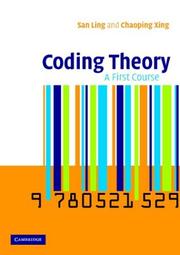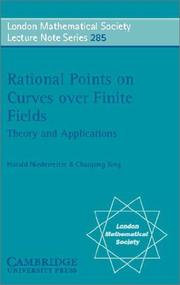| Listing 1 - 10 of 19 | << page >> |
Sort by
|

ISBN: 9780521529235 9780521821919 0521529239 0521821916 9780511755279 Year: 2004 Publisher: Cambridge Cambridge University Press
Abstract | Keywords | Export | Availability | Bookmark
 Loading...
Loading...Choose an application
- Reference Manager
- EndNote
- RefWorks (Direct export to RefWorks)
Coding theory --- Codage --- Coding theory.

ISBN: 113988252X 1107095549 1107103622 1107101131 1107089298 1107092272 1107325951 9781107089297 9781107325951 9781107095540 1299707203 9781299707207 0521665434 9780521665438 Year: 2001 Volume: 285 Publisher: Cambridge Cambridge University Press
Abstract | Keywords | Export | Availability | Bookmark
 Loading...
Loading...Choose an application
- Reference Manager
- EndNote
- RefWorks (Direct export to RefWorks)
Ever since the seminal work of Goppa on algebraic-geometry codes, rational points on algebraic curves over finite fields have been an important research topic for algebraic geometers and coding theorists. The focus in this application of algebraic geometry to coding theory is on algebraic curves over finite fields with many rational points (relative to the genus). Recently, the authors discovered another important application of such curves, namely to the construction of low-discrepancy sequences. These sequences are needed for numerical methods in areas as diverse as computational physics and mathematical finance. This has given additional impetus to the theory of, and the search for, algebraic curves over finite fields with many rational points. This book aims to sum up the theoretical work on algebraic curves over finite fields with many rational points and to discuss the applications of such curves to algebraic coding theory and the construction of low-discrepancy sequences.
Curves, Algebraic. --- Finite fields (Algebra) --- Rational points (Geometry) --- Coding theory. --- Data compression (Telecommunication) --- Digital electronics --- Information theory --- Machine theory --- Signal theory (Telecommunication) --- Computer programming --- Points, Rational (Geometry) --- Arithmetical algebraic geometry --- Modular fields (Algebra) --- Algebra, Abstract --- Algebraic fields --- Galois theory --- Modules (Algebra) --- Algebraic curves --- Algebraic varieties
Book
ISBN: 9780691102887 Year: 2009 Publisher: Princeton (N.J.) Princeton University Press
Abstract | Keywords | Export | Availability | Bookmark
 Loading...
Loading...Choose an application
- Reference Manager
- EndNote
- RefWorks (Direct export to RefWorks)
Book
ISBN: 9781400831302 Year: 2009 Publisher: Princeton, NJ
Abstract | Keywords | Export | Availability | Bookmark
 Loading...
Loading...Choose an application
- Reference Manager
- EndNote
- RefWorks (Direct export to RefWorks)
Book
ISBN: 1107145848 0511644329 9786612394744 1282394746 0511648103 0511187300 0511562179 0511755279 0511186371 Year: 2004 Publisher: Cambridge, UK ; New York : Cambridge University Press,
Abstract | Keywords | Export | Availability | Bookmark
 Loading...
Loading...Choose an application
- Reference Manager
- EndNote
- RefWorks (Direct export to RefWorks)
Coding theory is concerned with successfully transmitting data through a noisy channel and correcting errors in corrupted messages. It is of central importance for many applications in computer science or engineering. This book gives a comprehensive introduction to coding theory whilst only assuming basic linear algebra. It contains a detailed and rigorous introduction to the theory of block codes and moves on to more advanced topics like BCH codes, Goppa codes and Sudan's algorithm for list decoding. The issues of bounds and decoding, essential to the design of good codes, features prominently. The authors of this book have, for several years, successfully taught a course on coding theory to students at the National University of Singapore. This book is based on their experiences and provides a thoroughly modern introduction to the subject. There are numerous examples and exercises, some of which introduce students to novel or more advanced material.
Digital
ISBN: 9781400831302 9780691102887 Year: 2009 Publisher: Princeton, N.J. Princeton University Press
Abstract | Keywords | Export | Availability | Bookmark
 Loading...
Loading...Choose an application
- Reference Manager
- EndNote
- RefWorks (Direct export to RefWorks)
Multi
ISBN: 9783540769699 Year: 2007 Publisher: Berlin, Heidelberg Springer-Verlag Berlin Heidelberg
Abstract | Keywords | Export | Availability | Bookmark
 Loading...
Loading...Choose an application
- Reference Manager
- EndNote
- RefWorks (Direct export to RefWorks)
ThesixthInternationalConferenceonCryptologyandNetworkSecurity(CANS 2007) was held at the Grand Plaza ParkHotel, Singapore, 8-10 December 2007. The conference was sponsored byNanyangTechnologicalUniversity and theLee Foundation, Singapore. The goal of CANS is to promote research on all aspects of cryptology and network security, as well as to build a bridge between research on cryptography andnetworksecurity.The?rstInternationalConferenceonCryptologyandN- work Security was held in Taipei, Taiwan, in 2001. The second one was held in San Francisco, California, USA, on September 26-28, 2002, the third in Miami, Florida, USA, on September 24-26, 2003, the fourth in Xiamen, Fujian, China, on December 14-16,2005 and the ?fth in Suzhou, Jiangsu, China, on December 8-10, 2006. The program committee accepted 17 papers from 68 submissions. The - viewing process took nine weeks, each paper was carefully evaluated by at least three members of the program committee. We appreciate the hard work of the members of the program committee and the external referees who gave many hours of their valuable time. In addition to the contributed papers, there were six invited talks: - Artur Ekert:QuantumCryptography - Christian Kurtsiefer:AspectsofPracticalQuantumKeyDistribution Schemes - Keith Martin:ABird's-Eye ViewofRecentResearchinSecretSharing - Mitsuru Matsui: The State-of-the-Art Software Optimization of Block Ciphers andHashFunctions - Josef Pieprzyk:AnalysisofModernStreamCiphers - DavidPointcheval:AdaptiveSecurityforPassword-BasedAuthenticatedKey ExchangeintheUniversal-Composability Framework. We would like to thank all the people involved in organising this conference. In particular, we would like to thank the organising committee for their time A and e?orts, and Krystian Matusiewicz for his help with LT X.
Complex analysis --- Computer science --- Computer architecture. Operating systems --- Computer. Automation --- DES (data encryption standard) --- cryptologie --- complexe analyse (wiskunde) --- informatica --- maatschappij --- computerbeveiliging --- informatica management --- computernetwerken
Book

ISBN: 3642018130 3642018777 Year: 2009 Publisher: Berlin ; Heidelberg : Springer-Verlag,
Abstract | Keywords | Export | Availability | Bookmark
 Loading...
Loading...Choose an application
- Reference Manager
- EndNote
- RefWorks (Direct export to RefWorks)
This book constitutes the refereed proceedings of the Second International Workshop on Coding and Cryptology, IWCC 2009, held in Zhangjiajie, China, in June 2009. The 21 revised full technical papers, except one, are contributed by the invited speakers of the workshop. The papers were carefully selected during two rounds of reviewing and improvement for inclusion in the volume and address all aspects of coding theory, cryptology and related areas - such as combinatorics - theoretical or applied. Topics addressed are coding theory, secure codes, hash functions, combinatorics, boolean functions, authentication, cryptography, protocols, sequences, and secure communications.
Coding theory --- Cryptography --- Algebra --- Mathematics --- Physical Sciences & Mathematics --- Coding theory. --- Computational complexity. --- Computer networks. --- Computer science. --- Data encryption (Computer science) --- Informatics --- Communication systems, Computer --- Computer communication systems --- Data networks, Computer --- ECNs (Electronic communication networks) --- Electronic communication networks --- Networks, Computer --- Teleprocessing networks --- Complexity, Computational --- Data encoding (Computer science) --- Encryption of data (Computer science) --- Computer communication systems. --- Data encryption (Computer science). --- Computer science --- Computer Science. --- Data Encryption. --- Coding and Information Theory. --- Discrete Mathematics in Computer Science. --- Computer Communication Networks. --- Mathematics. --- Science --- Data compression (Telecommunication) --- Digital electronics --- Information theory --- Machine theory --- Signal theory (Telecommunication) --- Computer programming --- Computer mathematics --- Discrete mathematics --- Electronic data processing --- Computer security --- Data transmission systems --- Digital communications --- Electronic systems --- Information networks --- Telecommunication --- Cyberinfrastructure --- Network computers --- Distributed processing --- Cryptology. --- Information theory. --- Computer science—Mathematics. --- Communication theory --- Communication --- Cybernetics
Book

ISBN: 9783642018770 Year: 2009 Publisher: Berlin Heidelberg Springer Berlin Heidelberg
Abstract | Keywords | Export | Availability | Bookmark
 Loading...
Loading...Choose an application
- Reference Manager
- EndNote
- RefWorks (Direct export to RefWorks)
This book constitutes the refereed proceedings of the Second International Workshop on Coding and Cryptology, IWCC 2009, held in Zhangjiajie, China, in June 2009. The 21 revised full technical papers, except one, are contributed by the invited speakers of the workshop. The papers were carefully selected during two rounds of reviewing and improvement for inclusion in the volume and address all aspects of coding theory, cryptology and related areas - such as combinatorics - theoretical or applied. Topics addressed are coding theory, secure codes, hash functions, combinatorics, boolean functions, authentication, cryptography, protocols, sequences, and secure communications.
Ergodic theory. Information theory --- Discrete mathematics --- Computer science --- Computer architecture. Operating systems --- coderen --- DES (data encryption standard) --- discrete wiskunde --- cryptologie --- informatica --- computernetwerken --- informatietheorie
Book

ISBN: 9783540769699 Year: 2007 Publisher: Berlin Heidelberg Springer Berlin Heidelberg
Abstract | Keywords | Export | Availability | Bookmark
 Loading...
Loading...Choose an application
- Reference Manager
- EndNote
- RefWorks (Direct export to RefWorks)
ThesixthInternationalConferenceonCryptologyandNetworkSecurity(CANS 2007) was held at the Grand Plaza ParkHotel, Singapore, 8-10 December 2007. The conference was sponsored byNanyangTechnologicalUniversity and theLee Foundation, Singapore. The goal of CANS is to promote research on all aspects of cryptology and network security, as well as to build a bridge between research on cryptography andnetworksecurity.The?rstInternationalConferenceonCryptologyandN- work Security was held in Taipei, Taiwan, in 2001. The second one was held in San Francisco, California, USA, on September 26-28, 2002, the third in Miami, Florida, USA, on September 24-26, 2003, the fourth in Xiamen, Fujian, China, on December 14-16,2005 and the ?fth in Suzhou, Jiangsu, China, on December 8-10, 2006. The program committee accepted 17 papers from 68 submissions. The - viewing process took nine weeks, each paper was carefully evaluated by at least three members of the program committee. We appreciate the hard work of the members of the program committee and the external referees who gave many hours of their valuable time. In addition to the contributed papers, there were six invited talks: - Artur Ekert:QuantumCryptography - Christian Kurtsiefer:AspectsofPracticalQuantumKeyDistribution Schemes - Keith Martin:ABird's-Eye ViewofRecentResearchinSecretSharing - Mitsuru Matsui: The State-of-the-Art Software Optimization of Block Ciphers andHashFunctions - Josef Pieprzyk:AnalysisofModernStreamCiphers - DavidPointcheval:AdaptiveSecurityforPassword-BasedAuthenticatedKey ExchangeintheUniversal-Composability Framework. We would like to thank all the people involved in organising this conference. In particular, we would like to thank the organising committee for their time A and e?orts, and Krystian Matusiewicz for his help with LT X.
Complex analysis --- Computer science --- Computer architecture. Operating systems --- Computer. Automation --- DES (data encryption standard) --- cryptologie --- complexe analyse (wiskunde) --- informatica --- maatschappij --- computerbeveiliging --- informatica management --- computernetwerken
| Listing 1 - 10 of 19 | << page >> |
Sort by
|

 Search
Search Feedback
Feedback About UniCat
About UniCat  Help
Help News
News